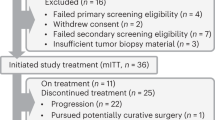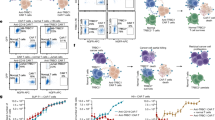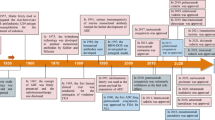Abstract
The therapeutic activity and toxicity profile of gemtuzumab ozogamicin were assessed in 40 patients >60 years of age with acute myeloid leukemia (AML) who were not considered eligible for conventional chemotherapy because of advanced age or poor performance status. The drug was administered at the dose of 9?mg/m2 as a single 2-h i.v. infusion on days 1 and 15. Patients who achieved a complete remission (CR/CRp) were to receive a consolidation with two additional injections of the immunotoxin at the same dose. The overall CR/CRp rate was 17% (95% CI, 8–32%). The CR/CRp rate in patients 61–75 years old was 33% (6/18), and 5% (1/22) in patients older than 75 years. Induction death occurred in seven patients (17%), all aged above 75 years. Overall survival was significantly longer in patients aged 61–75 years than in older individuals (P=0.05), and in CD33+ cases than in CD33− cases (P=0.05). We conclude that the dose/schedule of gemtuzumab ozogamicin used in this trial is too toxic in the age group over 75 years. For these patients, additional studies with reduced doses of the immunotoxin are warranted.
This is a preview of subscription content, access via your institution
Access options
Subscribe to this journal
Receive 12 print issues and online access
$259.00 per year
only $21.58 per issue
Buy this article
- Purchase on Springer Link
- Instant access to full article PDF
Prices may be subject to local taxes which are calculated during checkout


Similar content being viewed by others
References
Stone RM . The difficult problem of acute myeloid leukemia in the older adult. CA Cancer J Clin 2002; 52: 363–371.
Stasi R, Venditti A, Del Poeta G, Aronica G, Dentamaro T, Cecconi M et al. Intensive treatment of patients age 60 years and older with de novo acute myeloid leukemia: analysis of prognostic factors. Cancer 1996; 77: 2476–2488.
Leith CP, Kopecky KJ, Godwin J, McConnell T, Slovak ML, Chen IM et al. Acute myeloid leukemia in the elderly: assessment of multidrug resistance (MDR1) and cytogenetics distinguishes biologic subgroups with remarkably distinct responses to standard chemotherapy. A Southwest Oncology Group study. Blood 1997; 89: 3323–3329.
Hiddemann W, Kern W, Schoch C, Fonatsch C, Heinecke A, Wormann B et al. Management of acute myeloid leukemia in elderly patients. J Clin Oncol 1999; 17: 3569–3576.
Sekeres MA, Stone R . Older adults with acute myeloid leukemia. Curr Oncol Rep 2002; 4: 403–409.
Sievers EL, Appelbaum FR, Spielberger RT, Forman SJ, Flowers D, Smith FO et al. Selective ablation of acute myeloid leukemia using antibody-targeted chemotherapy: a phase I study of an anti-CD33 calicheamicin immunoconjugate. Blood 1999; 93: 3678–3684.
Sievers EL, Larson RA, Stadtmauer EA, Estey E, Lowenberg B, Dombret H et al. Efficacy and safety of gemtuzumab ozogamicin in patients with CD33-positive acute myeloid leukemia in first relapse. J Clin Oncol 2001; 19: 3244–3254.
McGavin JK, Spencer CM . Gemtuzumab ozogamicin. Drugs 2001; 61: 1317–1322, discussion 1323–1314.
van Der Velden VH, te Marvelde JG, Hoogeveen PG, Bernstein ID, Houtsmuller AB, Berger MS et al. Targeting of the CD33-calicheamicin immunoconjugate Mylotarg (CMA-676) in acute myeloid leukemia: in vivo and in vitro saturation and internalization by leukemic and normal myeloid cells. Blood 2001; 97: 3197–3204.
Jedema I, Barge RM, van der Velden VH, Nijmeijer BA, van Dongen JJ, Willemze R et al. Internalization and cell cycle-dependent killing of leukemic cells by Gemtuzumab Ozogamicin: rationale for efficacy in CD33-negative malignancies with endocytic capacity. Leukemia 2004; 18: 316–325.
Mitelman F . ISCN 1995: International System for Human Cytogenetic Nomenclature (1995). Basel: S Karger AG, 1995.
National Cancer Institute. Common Terminology Criteria for Adverse Events v3-0 (CTCAE). http://ctepinfonihgov/reporting/ctchtml, Accessed March 15, 2005.
Kalbfleisch JD, Prentice RL . The Survival Analysis of Failure Time Data, 2nd edn. Hoboken, NJ: John Wiley & Sons Inc., 2002.
Amadori S, Suciu S, Willemze R, Mandelli F, Selleslag D, Stauder R et al. Sequential administration of gemtuzumab ozogamicin and conventional chemotherapy as first line therapy in elderly patients with acute myeloid leukemia: a phase II study (AML-15) of the EORTC and GIMEMA leukemia groups. Haematologica 2004; 89: 950–956.
Amadori S, Suciu S, Jehn U, Stasi R, Thomas X, Marie JP et al. Use of glycosylated recombinant human G-CSF (lenograstim) during and/or after induction chemotherapy in patients 61 years of age and older with acute myeloid leukemia: final results of AML-13, a randomized phase 3 study of the European Organisation for Research and Treatment of Cancer and Gruppo Italiano Malattie Ematologiche dell'Adulto (EORTC/GIMEMA) Leukemia Groups. Blood 2005; 106: 27–34.
Ferrara F, Annunziata M, Copia C, Magrin S, Mele G, Mirto S . Therapeutic options and treatment results for patients over 75 years of age with acute myeloid leukemia. Haematologica 1998; 83: 126–131.
Vey N, Coso D, Bardou VJ, Stoppa AM, Braud AC, Bouabdallah R et al. The benefit of induction chemotherapy in patients age > or =75 years. Cancer 2004; 101: 325–331.
Lowenberg B, Zittoun R, Kerkhofs H, Jehn U, Abels J, Debusscher L et al. On the value of intensive remission-induction chemotherapy in elderly patients of 65+ years with acute myeloid leukemia: a randomized phase III study of the European Organization for Research and Treatment of Cancer Leukemia Group. J Clin Oncol 1989; 7: 1268–1274.
Estey EH, Thall PF, Giles FJ, Wang XM, Cortes JE, Beran M et al. Gemtuzumab ozogamicin with or without interleukin 11 in patients 65 years of age or older with untreated acute myeloid leukemia and high-risk myelodysplastic syndrome: comparison with idarubicin plus continuous-infusion, high-dose cytosine arabinoside. Blood 2002; 99: 4343–4349.
Nabhan C, Rundhaugen LM, Riley MB, Rademaker A, Boehlke L, Jatoi M et al. Phase II pilot trial of gemtuzumab ozogamicin (GO) as first line therapy in acute myeloid leukemia patients age 65 or older. Leuk Res 2005; 29: 53–57.
Acknowledgements
This work was supported in part by grants from the Wyeth Pharmaceuticals and the National Cancer Institute (grant numbers 5U10-CA11488-29 through 5U10-CA11488-35). Its contents are solely the responsibility of the authors and do not represent the official views of the National Cancer Institute (Bethesda, MD, USA). We thank Dr Jay Feingold for his advice and support. The following investigators are acknowledged for their participation in this study: Dr G Fillet, Liège (Belgium), and Dr X Thomas (Lyon, France).
Author information
Authors and Affiliations
Corresponding author
Rights and permissions
About this article
Cite this article
Amadori, S., Suciu, S., Stasi, R. et al. Gemtuzumab ozogamicin (Mylotarg®) as single-agent treatment for frail patients 61 years of age and older with acute myeloid leukemia: final results of AML-15B, a phase 2 study of the European Organisation for Research and Treatment of Cancer and Gruppo Italiano Malattie Ematologiche dell'Adulto Leukemia Groups. Leukemia 19, 1768–1773 (2005). https://doi.org/10.1038/sj.leu.2403901
Received:
Accepted:
Published:
Issue Date:
DOI: https://doi.org/10.1038/sj.leu.2403901
Keywords
This article is cited by
-
Acute Myeloid Leukemia: Update on Upfront Therapy in Elderly Patients
Current Oncology Reports (2019)
-
Successful repeated treatment of acute myeloid leukemia in early relapse with gemtuzumab ozogamicin alone
International Journal of Hematology (2014)
-
Efficacy and resistance of gemtuzumab ozogamicin for acute myeloid leukemia
International Journal of Hematology (2013)
-
Differences in drug approval processes of 3 regulatory agencies: a case study of gemtuzumab ozogamicin
Investigational New Drugs (2013)
-
Targeting survival cascades induced by activation of Ras/Raf/MEK/ERK, PI3K/PTEN/Akt/mTOR and Jak/STAT pathways for effective leukemia therapy
Leukemia (2008)



